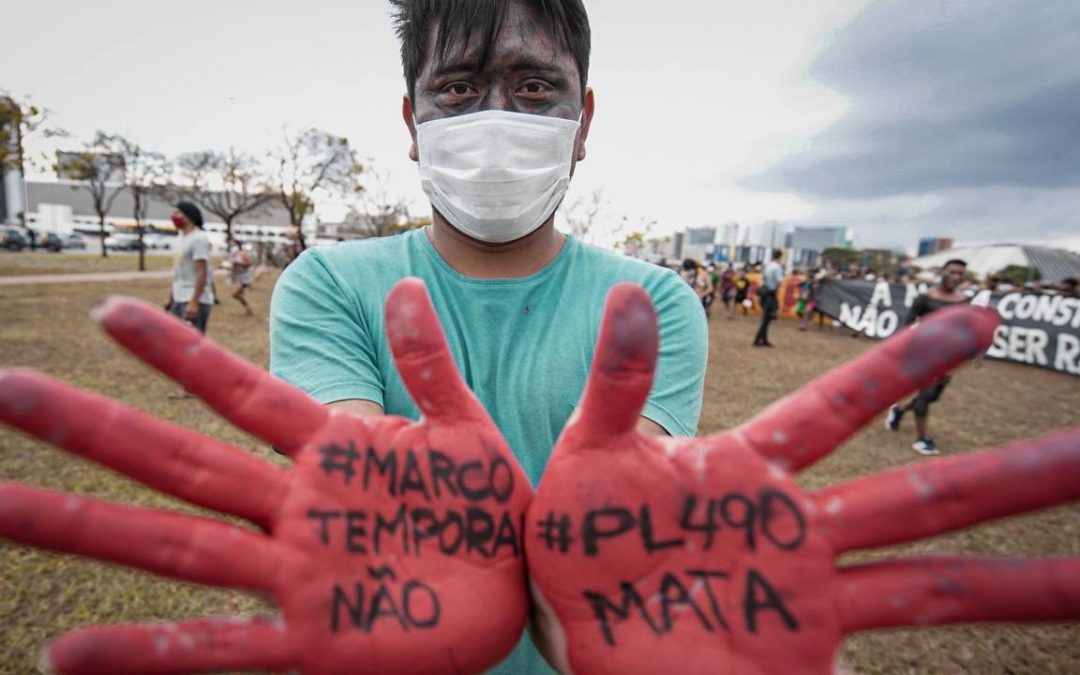
29/Jun/2021
On Monday (28), Apib – Articulation of the Indigenous Peoples of Brazil held an international meeting with non-governmental partner institutions and other stakeholders to discuss the emergency situation in Brazil. Convened the previous Friday, the meeting was attended by over 200 people from 26 countries from all regions of the world. This demonstrates the international interest in the situation experienced by Indigenous Peoples in Brazil, and the relevance of Apib as a global authority on issues involving indigenous peoples and the preservation of the environment.
During the meeting, which lasted about two hours, Apib leaders shared the institution’s view on the threats that are mounting in the National Congress against the territorial rights of indigenous peoples, especially in the context of Bill 490 of 2007. This Bill transfers to the Congress the responsibility of demarcating Indigenous Lands, which submits indigenous peoples to the interests of each legislature composition. Currently, the strong presence of agribusiness and the military would make it practically impossible to advance in the demarcation of territories that have not yet had their process concluded. On the contrary: there is the risk of regression, with the annulment of the approval of Indigenous Lands already consolidated.
Attorney Luiz Eloy Terena, of the Legal Coordination of Apib, also spoke about the trial by the Federal Supreme Court (STF) of the Special Appeal involving the Ibirama-Laklãnõ Indigenous Land, of the Xokleng people in Santa Catarina state. This action, which may be resumed by the STF plenary later this week, debates the thesis of the “temporal milestone” for the demarcation of indigenous lands, which has the status of “general repercussion”, meaning that the decision ruled in the case will guide future judicial decisions, legislative initiatives and even public policies on this issue.
Sônia Guajajara, Executive Coordinator of Apib, mediated the entire meeting directly from the Rise for the Earth Camp, which was established in Brasilia over a month ago and currently brings together about a thousand indigenous people who came from all regions of Brazil, even during the pandemic, to defend their rights. She informed the participants about the intense agenda of mobilizations planned for the coming months.
The Executive Coordinator of Apib, Dinaman Tuxá, also present at the meeting, shared with the international partners a broad vision of the violence and threats experienced by Indigenous Peoples in Brazil, which include constant attempts to invade their lands.
Towards an International Indigenous Mobilisation
Marielle Ramirez, an Apib collaborator, reinforced the importance of the support of international partners to strengthen the struggle of Indigenous Peoples in Brazil. “What we are proposing is more than the participation in a tweet, in a Petition: we propose a permanent articulation, which is constantly aware of the threats we live in Brazil”, said Sônia Guajajara.
Apib already has a strengthened network of partners around the world, and hopes to reinforce this network with the International Indigenous Mobilization through a series of meetings and political alignments that will intensify in July, such as dialogue with UN institutions, with Embassies and Diplomatic Representations in Brazil, among others.
If you or your institution wish to be part of this Mobilization and receive more information about Apib’s actions, please register by clicking here.
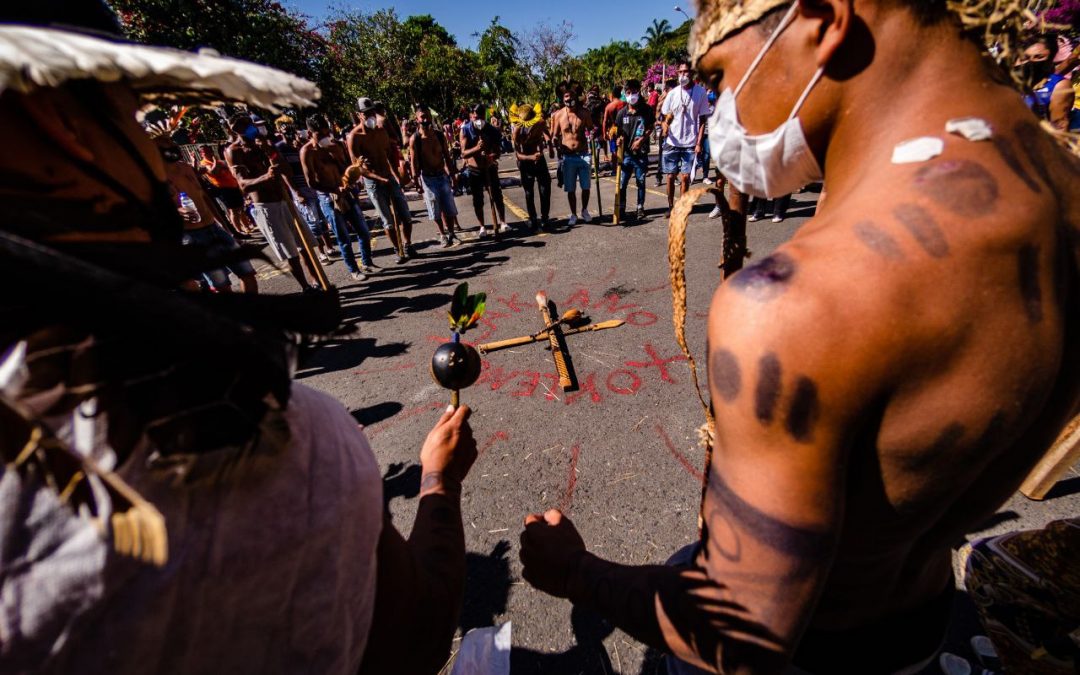
23/Jun/2021
Presidents of the Chamber of Deputies and of the Commission of Constitution and Justice maneuver to approve bill that allows the annulment of Indigenous Territories and makes demarcations unfeasible
Under the leadership of ruralists and Bolsonaro’s allies, the Chamber’s Commission of Constitution and Justice (CCJ) approved, by 40 votes to 21, the Bill (PL) 490/2007. The voting ended this afternoon, June 23, after a battle of requests and procedural issues posed by opposition members, who tried to withdraw the bill from the agenda throughout the day. This Thursday, the commission analyzes eight of deputy Arthur Maia’s provisions on the bill, after which the legislation goes to a plenary vote, at an undermined date. The indigenous movement remains mobilized against the anti-indigenous agenda in Congress.
The president of the Chamber, Arthur Lira (PP-AL), and the president of the Commission, Bia Kicis (PSL-DF), maneuvered to delay the beginning of the main plenary session, allowing the committee meeting to be extended, and the bill to be approved. Since mid-morning, Kicis rejected, one by one, the numerous claims, requests for a public hearing and calls for dialogue with the Indigenous movement, which for weeks has been demanding to be heard regarding the proposal, as determined both by the Constitution and Convention 169 of the International Labor Organization (ILO).
The PL 490 is a top priority for Jair Bolsonaro and for the ruralist caucus that claims to represent agribusiness. The bill will make demarcations unfeasible, allow the annulment of Indigenous Territories and pry them open to predatory projects, such as mining, roads and major hydroelectric plants. The bill is unconstitutional, as assessed by members of the Indigenous movement and legal experts.
Kicis suspended the commission’s meeting scheduled for yesterday, after a peaceful protest by Indigenous people against PL 490 turned violent as police outside the Chamber approached in riot gear. In an act considered unusual and authoritative, she established the proposal as the only item on today’s agenda.
Police violence left three Indigenous people injured and another ten had sustained minor injuries from the confrontation. The demonstrators were protesting peacefully in the parking lot of Annex 2 of the Chamber, when they were violently attacked by the Military Police, with rubber bullets and tear gas. Children and elderly people were among the protesters.
In a statement, 170 organizations (Indigenous and allies in the resistance of the original peoples) expressed their repudiation regarding the repression carried out against the demonstrators in Brasília. “The Indigenous people who left their communities, at a time when the pandemic is still raging in the country, to take their indignation to the streets against the violent advance of various sectors on their territories are those willing to help society build a new path,” says an excerpt of the release. Read the full document here.
“What we want is for the law to be enforced, for the Federal Constitution to be upheld. This bill can nullify the demarcation of Indigenous lands in the country – it is an aggression against the original peoples,” said Dinamam Tuxá, Executive Coordinator of the Association of Indigenous Peoples of Brazil (APIB).
The demonstration is part of the Rise for Earth Camp (Acampamento Levante da Terra), which has been set up next to the National Theater, in Brasília, for the past three weeks, to protest against the anti-Indigenous agenda of the government and Congress, as well as in defense of favorable decisions at the Federal Supreme Court (STF). Approximately 850 Indigenous people from 48 different peoples from all regions of Brazil, are gathered in the Camp. They are all vaccinated and following sanitary protocols (physical distancing, use of masks and constant hand hygiene).
Unconstitutionality
“Our Constitution cannot be changed by any selfish, personal interest from those who look greedily toward Indigenous Territories. This is the look we see on all the speeches that want to get PL 490 approved. Pure greed for the natural resources of the Indigenous lands, which are guaranteed by the Federal Constitution,” criticized Deputy Joenia Wapichana (Rede-RR).
According to the parliamentarian, the legislative procedure in the Commission was flawed, precisely because it failed to recognize that the matter is unconstitutional. Deputy Wapichana recalled that any regulation of Article 231 of the Constitution, which provides for Indigenous rights, should be done through a Supplementary Law Bill, and not through an Ordinary Law Project, as is the case with PL 490.
Several opposition parliamentarians recalled that the Federal Supreme Court should rule on several of the points provided for in PL 490, such as the “Temporal Mark”. This is a thesis by the ruralist caucus, which claims that Indigenous communities would only have the right to the lands that were in their possession as of October 5, 1988, the date on which the Constitution was enacted.
“They try to rush this matter into a bill so that there could be a competition with the Supreme Court. This is absurd,” Wapichana stressed.
Prejudice and discrimination against Indigenous People
Yesterday and today, government deputies made speeches that can be considered prejudiced and discriminatory against the protesters of this bill and Indigenous peoples in general. Deputy Alê Silva (PSL-MG) even compared Indigenous reserves to “human zoos” and accused the demonstrators outside the Congress of “troublemakers” and referred to them as “dumb.”
Yesterday, Arthur Lira accused Indigenous people of using drugs on the roof of the parliament. “Last week, some representatives of the Indians arrived here, invaded the National Congress, climbed to the top of the domes and sat there using some kind of drug,” he said, with no any proof whatsoever.
Joênia Wapichana also announced that she will file a complaint to the Ethics Council against another leader of Bolsonaro’s shock troop, Carla Zambelli (PSL-SP). According to Wapishana, when she met Zambelli in the Chamber’s corridors, she stated that “your Indians are murderers” and that Joênia would not represent the Indigenous People in the Chamber.
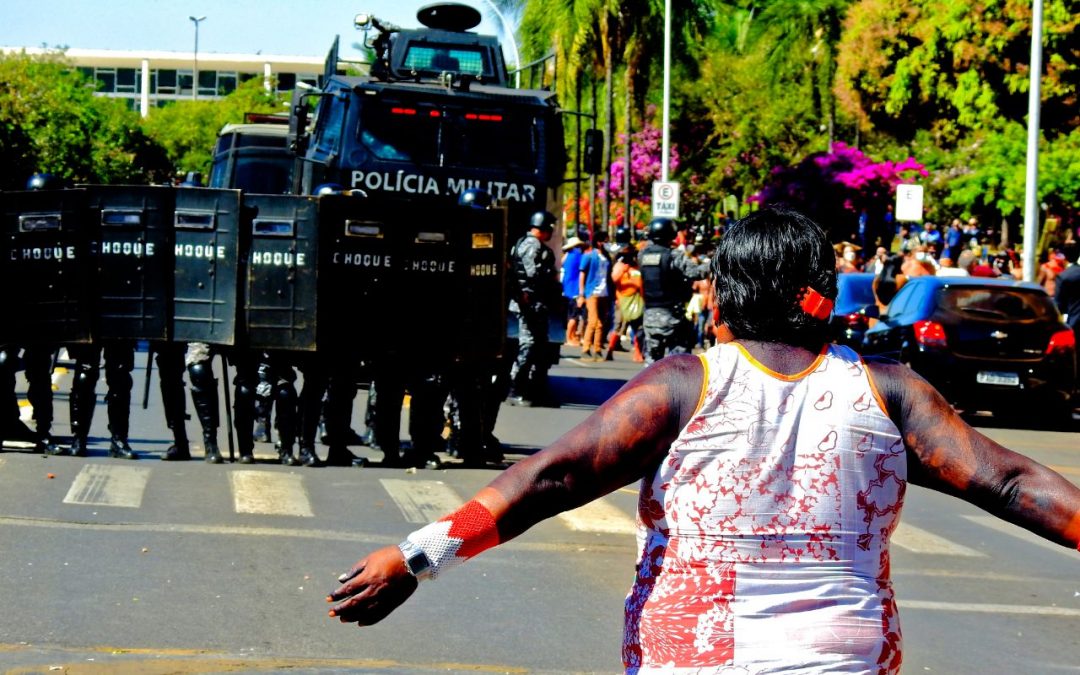
23/Jun/2021
Note from the Articulation of Indigenous Peoples of Brazil
Brasilia June 23, 2021
We struggle with our prayers and chants. Our shields are the maracas and our ancestry. The Government welcomes the agrobusiness through the front door and the indigenous people with gas bombs, pepper spray, rubber bullets, riot police and hate!
In the midst of the Covid-19 pandemic, we decided to mobilize the Rise for Earth camp, in Brasília, and prevent the advance of the Federal Government’s anti-indigenous agenda. For the first time in history, a president of the National Indigenous Foundation (Funai) closes the dialogue and represses the indigenous movement using heavy police force in the federal capital.
We are attentive to Bill 490, which is on the voting agenda of the Chamber’s Constitution and Justice Commission (CCJ). An unconstitutional proposal that could end the demarcation of Indigenous Lands. Since the 8th of June we have been holding demonstrations against the bill vote, in the outskirts of Congress, but yesterday (22) our mobilization was repressed by the police in yet another attempt to silence our voices.
The Federal Constitution of 1988 is being torn down to violate our rights and increase environmental attacks. We decided to fight to the end to ensure not only the future of indigenous peoples, but also the future of humanity.
We know that the attacks will not stop and that we are not privileged to stop fighting. We will continue in the federal capital, swinging our maracas so that the whole world knows the importance of our lives until the last indigenous person.
We have no choice or we die from the virus or we are slaughtered by the Government’s death policy. We cannot suffer so much violence without reacting. We are in this fight for life and that is why we continue to shout: Indigenous blood, not a single drop more!
For the life and historical continuity of our peoples, “Tell the people to move forward”.
Articulation of Indigenous People of Brazil
Apib regional base organizations:
APOINME – Articulation of Indigenous Peoples of the Northeast, Minas Gerais and Espírito Santo
ARPIN SUDESTE – Articulation of Indigenous Peoples of the Southeast
ARPINSUL – Articulation of Indigenous Peoples of the South
ATY GUASU – Great Assembly of the Guarani people
Guarani Yvyrupa Commission
Terena People’s Council
COIAB – Coordination of Indigenous Organizations in the Brazilian Amazon
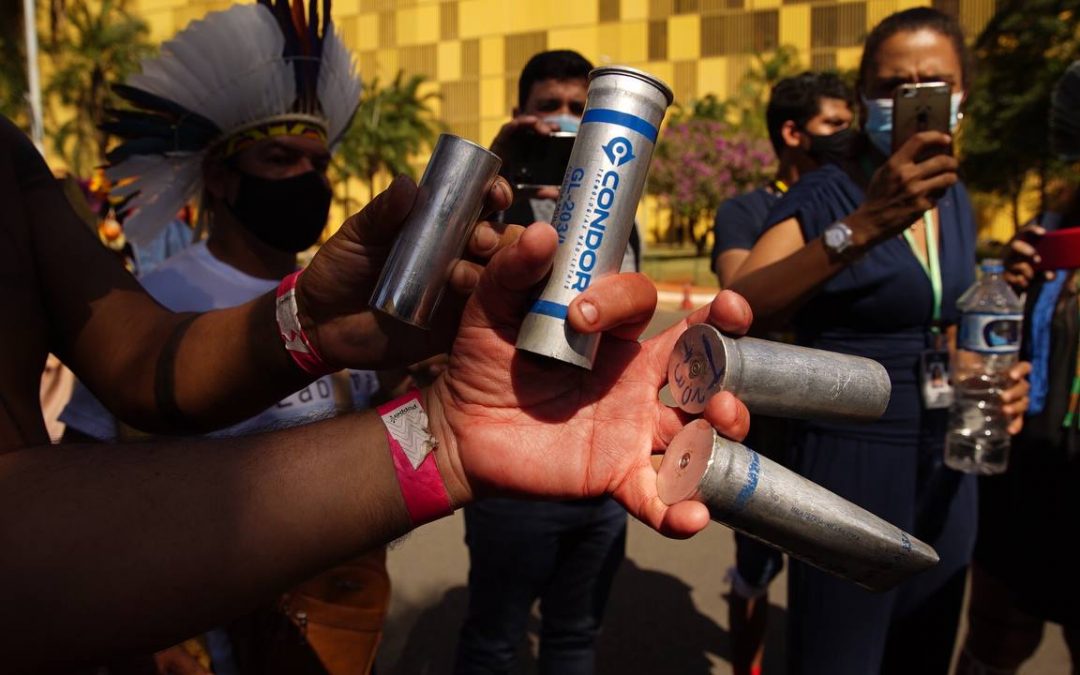
22/Jun/2021
A group of indigenous people, including some children and elderlies, was attacked by the police this afternoon, during a pacific demonstration against the deliberation about Bill 490/2007 by the Brazilian National Assembly. The legal proposition that can nullify the process of demarcating indigenous lands finds itself included in the agenda of the National Assembly Commission for the Constitution and Justice. The attacks took place at the Assembly parking lot, with the use of rubber bullets, stun bombs and tear gas.
Two indigenous people (a man and a woman) are under observation due severe injuries in the “Hospital de Base” in Brasília. Around ten children, elderlies and women had light injuries and needed to be treated by the health care service from the Rise for the Earth camp, organised by Apib – Brazilian Indigenous People Association. The emergencial care for the injured people was made difficult by the police, as can be observed in some videos that record the precise moment of the attack.
The protesters were marching together by the Esplanada dos Ministérios (avenue where the most part of National Ministries are situated), when they were reached by the police, close to the National Assembly entrance. There were no action or incident caused by the indigenous people to justify the violent reaction from the police forces. According to the protesters, there were members of several police forces assembled, with a large number of repression equipment, including one ‘caveirão” (a military tank used by the police during special operations against Brazilian citizens) and a mounted troop.
This indigenous parade is part of the Rise for the Earth Camp, situated close to the National Theater during the last three weeks. Around 850 indigenous people are gathered at this camp – they belong to 48 different peoples from all Brazilian regions. They are moved by the legislative innovations under appreciation by the National Assembly that threaten their rights, mainly territorial ones.
“The relatives just came to protest against the 490 Bill, that will terminate the policy of indigenous land demarcation, and the police arrived already with their bombs. They can gather to retreat our rights, however, when we try to manifest in reaction, we are received with violence”, stated Alessandra Korak Mundukuru. “We are here along with children and elderlies, many people were hurt”, she finishes.
The struggle keeps alive
The session of the Commission for the Constitution and Justice was postponed – it is expected to be resumed tomorrow. During the police attack, some congressmen allied to the indigenous agenda formed a kind of barrier to restrain the troops that kept threatening the indigenous people who performed their rituals and chants. Afterwards, several oppositional congressmen assembled with the protesters. They criticized the police action and promised to denounce it before the National Assembly president, Congressman Arthur Lira.
The 490 Bill is a demand from ruralist and Bolsonarist congressmen, and, if ruled, it will avoid new demarcations, allow the nullification of Indigenous Lands, and deliver those lands to predatory enterprises, such as minery, roads and hydroelectric plants. This is an unconstitutional rule that represents an open door for a new genocide of indigenous peoples.
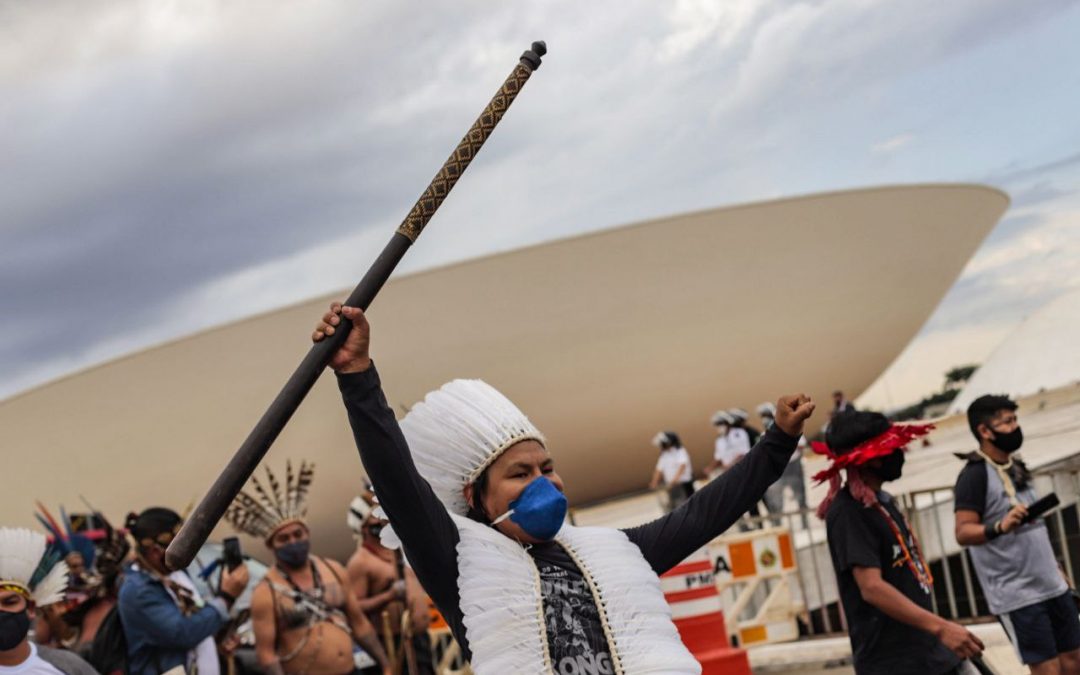
17/Jun/2021
MANIFEST FOR THE RIGHT TO LIFE AND THE TERRITORY OF INDIGENOUS PEOPLES
We, indigenous peoples, live in a state of constant threat, which requires us to be in constant vigilance and mobilization. Right now, June 2021, still under the restrictions of a devastating pandemic that is approaching the victimization of 500,000 Brazilians, of which 1,110 indigenous people are part of, we are forced to intensify our struggles and amplify our voice of protest to defend our most basic rights: our lives and our territories.
The fight for life called, and we came to Brasília to set up our Rise for the Earth camp in defense of our rights, most importantly, territorial. We returned to occupy the grounds of the federal capital after two years without in-person mobilizations, especially the Acampamento Terra Livre (largest assembly of indigenous peoples in Brazil, which, due to the Covid-19 pandemic, was held virtually in 2020 and 2021).
Our leaders, who are already fully immunized with the vaccine against the new coronavirus, gather at this moment to echo our maracas and reaffirm that, in the midst of the greatest health and humanitarian emergency in recent years, Indigenous Lives Matter.
In this manifesto, we reaffirm our banners of struggle and decree our PERMANENT STATE OF MOBILIZATION.
FOR THE IMMEDIATE INTERRUPTION OF ANY ANTI-INDIGENOUS MEASURES AT THE NATIONAL CONGRESS!
1. Final withdrawal from the CCJC voting agenda and shelving of Law Reform Process (Bill) 490/2007, which threatens to nullify the demarcations of indigenous lands;
2. Shelving of 2633/2020 Bill, known as Land Grabbing bill. If approved, the project will give amnesty to land grabbers and legalize land theft, further aggravating violence against indigenous peoples;
3. Shelving of 984/2019 Bill, which intends to build roads through the Iguaçu National Park and other Conservation Units;
4. Shelving of 177/2021 Bill, which authorizes the President of the Republic to abandon Convention 169 of the International Labor Organization (ILO), the only international treaty ratified by Brazil that specifically and comprehensively addresses the rights of indigenous peoples;
5. Shelving of 191/2020 Bill that authorizes the exploration of indigenous lands by large infrastructure and industrial mining projects;
6. Shelving of 3729/2004 Bill, which destroys the environmental licensing and brings major setbacks for the protection of the environment and for guaranteeing the rights of populations affected by the environmental degradation of infrastructure projects, such as hydroelectric plants.
These genocidal and ecocidal projects use the Covid-19 pandemic as a smokescreen, increasing violence against indigenous peoples and conflicts in our territories, including among indigenous people. These conflicts are fueled by the Government with the objective of dividing, weakening and demobilizing our peoples, organizations and leaders. Be aware that we will not let this strategy overwhelm us!
FEDERAL SUPREME COURT (STF): OUR RIGHTS MUST BE GUARDED AND PROTECTED!
The Brazilian Constitutional Court debates a case of general repercussion on the demarcation of indigenous lands, the well-known Extraordinary Appeal (RE) 1,017,365 related to the case of the Xokleng-La Klanõ Indigenous Land, belonging to the Xokleng people, in Santa Catarina state. The status of “general repercussion” given by the STF to the case means that its resolution will serve as a guideline for the federal government and all instances of the Judiciary regarding the demarcation of indigenous lands, in addition to serving to guide legislative proposals that address rights of original peoples – such as bill 490, which opens indigenous lands to predatory exploitation and makes new demarcations impossible in practice.
This process has been suspended due to the intervention of Minister Alexandre Moraes. The STF has a duty to protect our constitutional right to our territories! The trial must be resumed!
Especially in this moment of attacks, the voice of the Supreme Court needs to echo strongly and guarantee to the Yanomami and Munduruku peoples the removal of invaders from their lands. This same protection should be extended to five other Indigenous Lands (TIs), also discussed at the STF: TIs Karipuna and Uru-Eu-Wau-Wau, in Rondônia, TIs Kayapó and Trincheira-Bacajá, in Pará and TI Araribóia, in Maranhão.
This is what Apib is demanding at this time, with a proper sense of urgency, from the ministers of the Supreme Court. We do this through this document, through the voices of our leaders, from our territories throughout Brazil, and also concentrated in the Rise for the Earth camp in Brasília. We also do it in court, within the scope of the Action for Non-compliance with Fundamental Precepts (ADPF) 709/2020, authored by Apib and several national institutions in solidarity with indigenous peoples. The ADPF 709/2020 is on the agenda of the STF, and must be debated by the plenary until June 18th.
For the life and historical continuity of our peoples, tell the people to move forward!
Rise for the Earth
Brasília – Federal District, June 17, 2021.
Apib – Articulation of Indigenous People of Brazil
Apib regional base organizations:
APOINME – Articulation of Indigenous Peoples of the Northeast, Minas Gerais and Espírito Santo
ARPIN SUDESTE – Articulation of Indigenous Peoples of the Southeast
ARPINSUL – Articulation of Indigenous Peoples of the South
ATY GUASU – Great Assembly of the Guarani people
Guarani Yvyrupa Commission
Terena People’s Council
COIAB – Coordination of Indigenous Organizations in the Brazilian Amazon
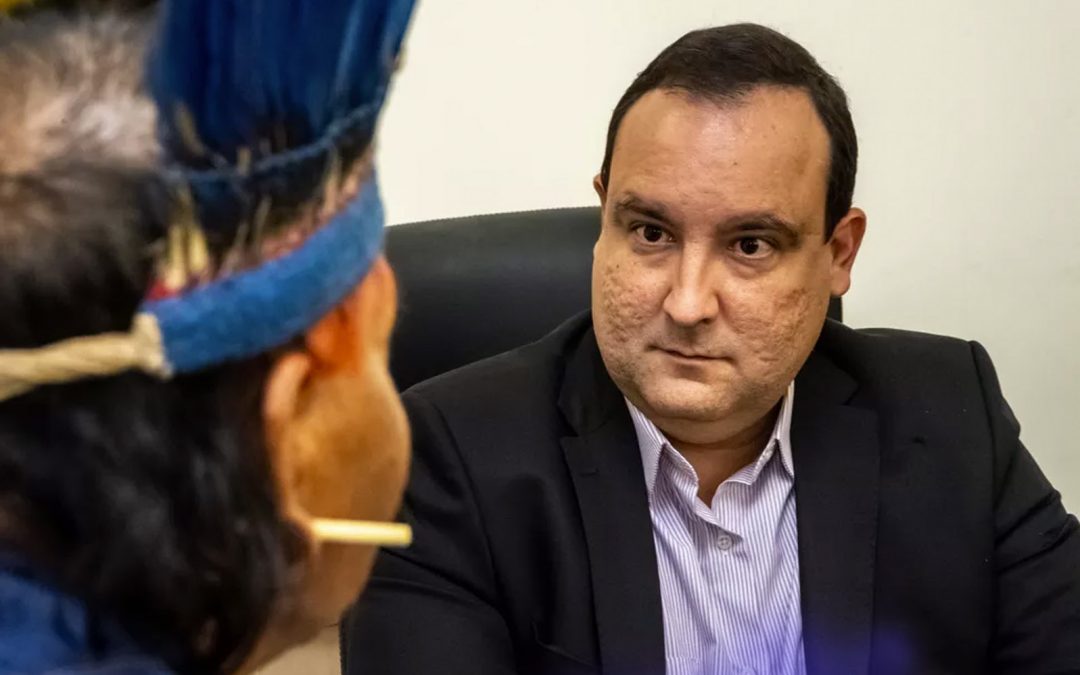
16/Jun/2021
(FUNAI is the National Foundation responsible for developing public policies regarding indigenous peoples and territories. This institution should provide the appropriate conditions for a peaceful and fulfilling life for brazilian indigenous people, including safety and protection against any threat or violence)
We, indigenous peoples gathered at the Rise for the Earth Camp, in Brasília, have been mobilized for more than 10 days against the anti-indigenous agenda that is currently under appreciation by the Executive, Legislative and Judiciary Powers. This agenda includes legal innovations that put all indigenous lives at risk.
Still under the restrictions of the pandemic, with most of us vaccinated – vaccination that only happened due to a lot of struggle from the indigenous movement, we brought together more than 1,000 indigenous people from all regions of Brazil to state: the police chief Marcelo Xavier is no longer the president for FUNAI!
This is the worst term in the Foundation’s history, which failed to fulfill the function of protecting and promoting the rights of indigenous peoples, in order to negotiate our lives and use them for the benefit of shady and private interests from agribusiness, illegal mining and so many other threats that put our existence at risk.
A police chief who has turned Funai into the “Foundation for the Indigenous People Intimidation”, an institution that is currently closer to a political police service, that persecutes and criminalizes indigeneous leaderships. It institutes anti-indigenous administrative acts, such as Normative Instruction No. 09 and others; negotiates measures in the National Congress, such as the position he expressed in favor of indigenous peoples’ enemies before the National Assembly Commission for the Constitution and Justice (CCJ), bizarrely asking for the approval of 490 bill.
In practice, this bill terminates the policy of demarcating indigenous lands in the country, and still opens up the possibility of revising previously demarcated lands.
Enough of nonsense!
Dump Marcelo Xavier!
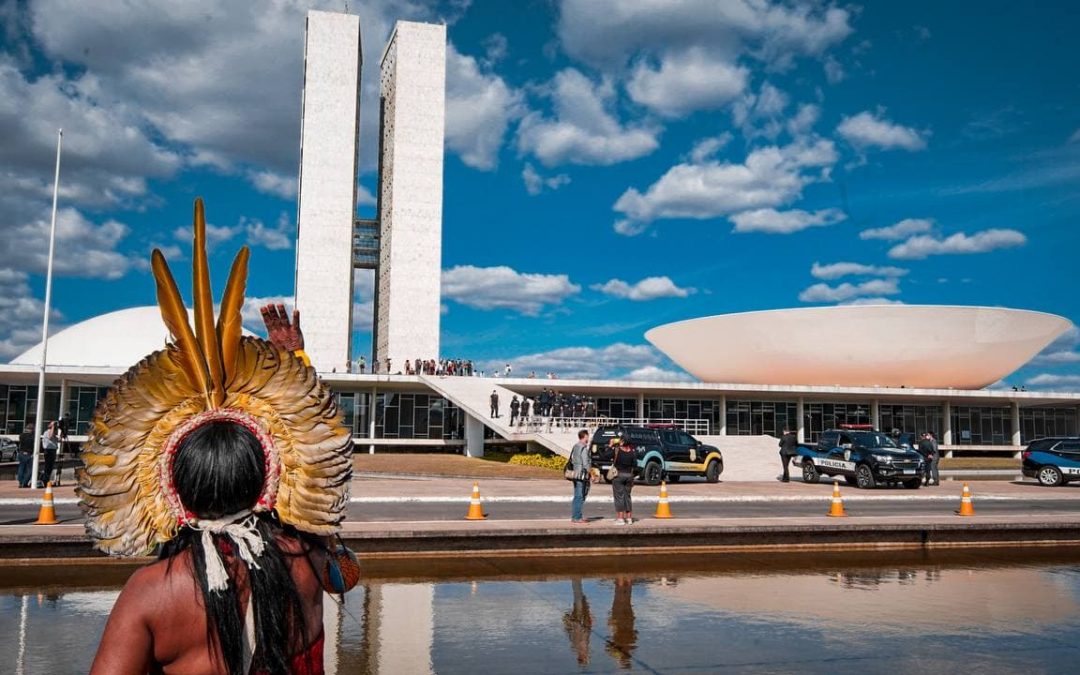
14/Jun/2021
The Association of Indigenous Peoples of Brazil (APIB), along with all its fellow organizations, demands that Bill 490/2007 be definitively pulled from the voting agenda of the Commission of Constitution and Justice (CCJ) of the Chamber of Deputies.
In practical terms, this project represents a new genocide against Indigenous Peoples. The Bill is unconstitutional and could end the demarcation of Indigenous Lands in Brazil, allowing for the opening of territories for predatory exploitation. In addition to Bill 490, other anti-indigenous proposals that pose risks to the environment are on the agenda in Congress.
Indigenous lives matter, and in the midst of the Covid-19 pandemic, our lives have become the target of attacks, persecution and extermination. In this sense, we underscore the following demands:
- Definitive removal of Bill 490/2007 from the CCJ voting agenda, which opens up Indigenous lands to predatory economic exploitation and would essentially make new demarcations of indigenous territories impossible. This bill would allow the government to open Indigenous lands to extractive industries like mining, enable the legalization of hundreds of illegal mining sites, and force contact with isolated Indigenous peoples;
- Shelving of Bill 2633/2020, known as “PL da Grilagem” [Land grabber’s Bill], from the voting agenda of the National Congress. Bill 2633, the successor to Provisional Measure 910, deals with the regularization of private occupations on public lands. If approved, could legalize thousands of claims to recently deforested land;
- Shelving of Bill 984/2019, which aims to build roads on the Iguaçu National Park and other Conservation Units;
- Shelving of Bill 177/2021, that would authorize the President of the Republic to withdraw support to Convention 169 of the International Labor Organization (ILO);
- Shelving of Bill 191/2020, authorizing exploration on indigenous lands for major infrastructure and mining projects. Bill 191/20 intends to transform indigenous lands into a new frontier of destruction, opening them, without due care or respect to the will of indigenous peoples, to some of the most impacting economic activities existent, such as mining, oil exploration, construction of large hydroelectric plants and small-scale artisanal mining;
These projects, which we have repeatedly denounced as genocidal and ecocidal, found in the Covid-19 pandemic the ideal excuse to “run the cattle herd” [changing all the rules and simplifying standards], which has led to a spike in violence and conflicts, including among relatives. These conflicts are inflamed by the Brazilian government leaders in the ongoing battle to defend and guarantee the respect for basic rights.
In a sick world, and faced with a project for extermination, our struggle is still for life, and against all the viruses that kill us!
For the life and historical continuity of our peoples, “Tell the people to move forward.”
APIB – Articulação dos Indígenas do Brasil
Organizações regionais de base da APIB:
APOINME – Articulação dos Povos Indígenas do Nordeste, Minas Gerais e Espírito Santo
ARPIN SUDESTE – Articulação dos Povos Indígenas do Sudeste
ARPINSUL – Articulação dos Povos Indígenas do Sul
ATY GUASU – Grande Assembléia do povo Guarani
Comissão Guarani Yvyrupa
Conselho do Povo Terena
COIAB – Coordenação das Organizações Indígenas da Amazônia Brasileira
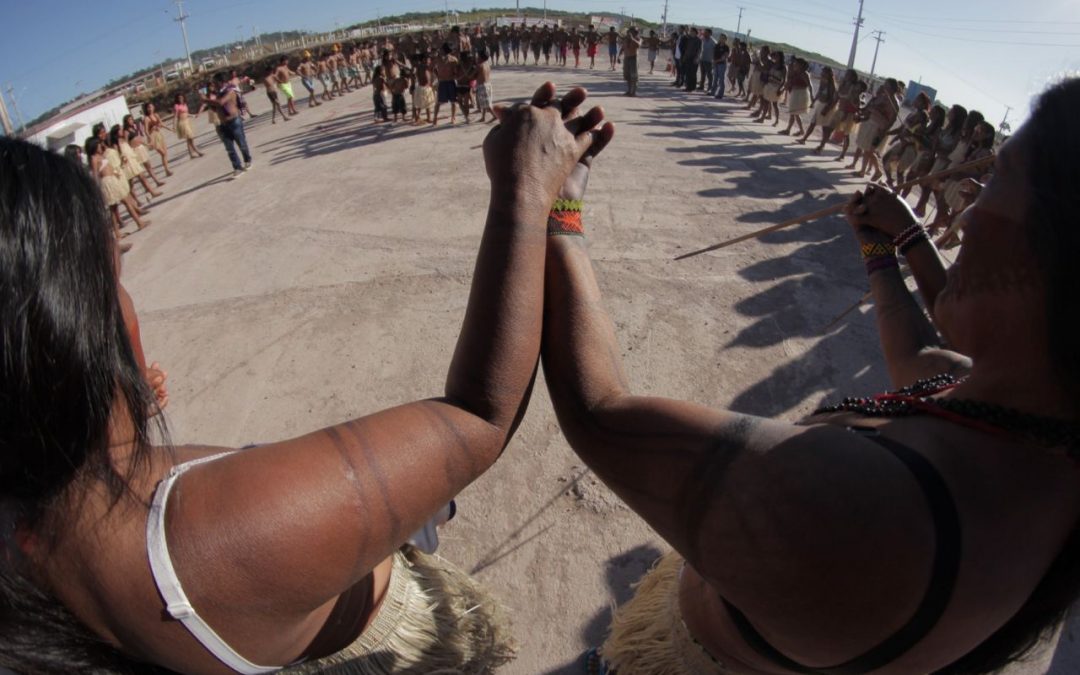
28/May/2021
All our Munduruku people are outraged with the cancellation of the Federal Police operation in our region. The operation cannot end now, when the invaders are attacking the leaders. We are unable to understand how the operation leaves our territory at this moment of so much danger to us. We’re screaming for help!
We demand that this operation against illegal mining be continued and that the security forces return to expel all the miners that are still within our area and ensure the safety of our people. The mines have not been closed and our villages and leaders continue to be attacked and threatened. On the 26th May, Fazenda Tapajós village was invaded by these criminals with gunshots and the houses were set on fire.
Other villages and leaders are being threatened. If they do not arrest who is threatening us, we will die and it will be the fault of the federal government and everyone who encouraged the violence. We are dying poisoned by mercury and in danger of being murdered by the miners.
The miners protested and attacked the National Security Forces and after that the operation was withdrawn, leaving our region. The operation that was supposed to end illegal mining ended up obeying the invaders who work illegally and stopped the police operation. In the meantime, we leaders who protect our territory are living in constant fear that the worst will happen. We no longer have peace for our families within our own land and in our homes.
With the operation stalled and the security forces that promised to protect us have left, we are now left on our own in the middle of the conflict. The pariwat (white people) continue to set us against each other, without respecting our territory, our culture, our life and the future of our children. The government once again makes a premeditated move to kill us in our own land. A farce announced to protect criminals, which did not close mines within Munduruku Indigenous Land and did not manage to contain and prevent the attack on our leaderships, leaving the territory after being pressured by criminals, legitimizing all these illegal practices and giving strength to the invaders. We no longer want this type of inefficient operation, which leaves us even more unprotected. We want the lasting and effective presence of the State, fulfilling its constitutional duty to protect indigenous lands, complying with court decisions and the recommendations of the MPF to remove illegal mining from our lands and protect the lives of our people.
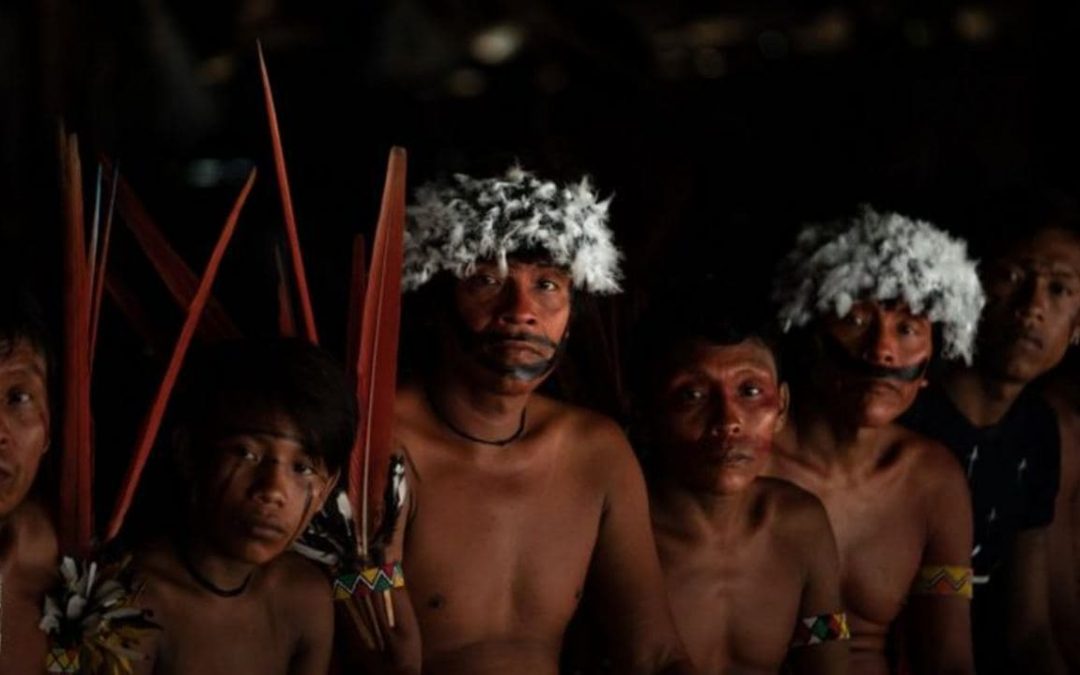
17/May/2021
YANOMAMI ALERT
The Articulation of the Indigenous Peoples of Brazil (Apib) comes out to the public to express extreme indignation and concern at the escalation of violence committed by landgrabbers against indigenous communities in the Yanomami Indigenous Land, in Roraima, and the negligence with which the situation has been treated by the public authorities. We are facing the risk of another massacre.
To get a sense of the seriousness of the facts, since May 10, the Hutukara Yanomami Association reports a terror routine with intimidation and shooting attacks on the Palimiu community. The most recent occurred around 11 pm on Wednesday (12), when miners divided into 40 boats fired heavily on the village. Daily, miners travel the rivers of the region, whose control was taken by them, displaying and transporting ostentatious weaponry as a threat.
Unfortunately, there’s nothing new about the situation in the Yanomami Indigenous Land. The report “Massacres no campo”, by the Pastoral da Terra Commission, records attacks by landgrabbers against Yanomamis since the 1980s. In 1987, 7 indigenous people were murdered and 47 injured after the invasion of 150 landgrabbers in the Serra de Couto Magalhães. In April of the following year, 1988, 8 Yanomami were killed after fighting in the Paapiú region. In 1993, the village Haximu, on the border with Venezuela, was surprised by an attack by heavily armed miners, resulting in a bloody massacre that killed 5 children and 5 adults, including women and elderly. The novelty of this wave of attacks is evidence of the participation of criminal organizations linked to drug trafficking in gold mining activities, especially in regions with greater gold extraction.
Another form of violence committed is the conflicts caused by langrabbers between the Yanomami communities themselves. In 2013, an armed confrontation between Yanomami resulted in 5 indigenous people killed and 7 injured in the Alto Alegre region. At the time, there were reports that langrabbers were arming Yanomami in exchange for permission to illegally mine gold in the territory. Other attacks and threats in February and April this year had also been reported by the Hutukara Yanomami Association.
It is necessary to highlight that the langrabbers activity aggravates the impacts of the Covid-19 pandemic in the territory, since they are vectors of the disease, and its presence implies tension, conflicts and psychological damage. In addition, outbreaks of malaria, lack of health care and food insecurity weigh on the lives of communities in the Yanomami indigenous land. The landgrabbers took a strategic point on the Uraricoera and Parima rivers by assault, charging tolls and making it difficult for indigenous people to access and circulate within their territory.
Predatory exploitation of natural resources has always been a problem on our land. In the name of profit, they destroy, pollute, rape and kill the environment and native peoples. Public authorities should have taken steps to safeguard indigenous lives. However, today, we are forced to warn again about the imminent possibility of a new massacre.
Apib filed a request with the Federal Supreme Court, on May 11, through ADPF 709 to demand the removal of invaders from Yanomami indigenous land. The Brazilian State is aware of the worsening tensions and its choices will say what the institutions’ priorities are: to neglect the situation and, therefore, not to fight illegal mining or to protect the right to life of the indigenous peoples of the Yanomami Indigenous Land.
Thus, we sympathize and endorse the complaints made by the organizations Hutukara Yanomami Association and Wanassedume Ye’kwana Association. We reiterate that we will not rest while our peoples are under attack.
May 13, 2021,
APIB – Articulation of Indigenous Peoples of Brazil
COIAB – Coordination of Indigenous Organizations in the Brazilian Amazon
Regional grassroots organizations:
APOINME – Articulation of Indigenous Peoples of the Northeast, Minas Gerais and Espírito Santo
SOUTHEAST ARPIN – Articulation of Indigenous Peoples in the Southeast
ARPINSUL – Articulation of Indigenous Peoples of the South
ATY GUASU – Great Assembly of the Guarani people
Guarani Yvyrupa Commission
Terena People’s Council
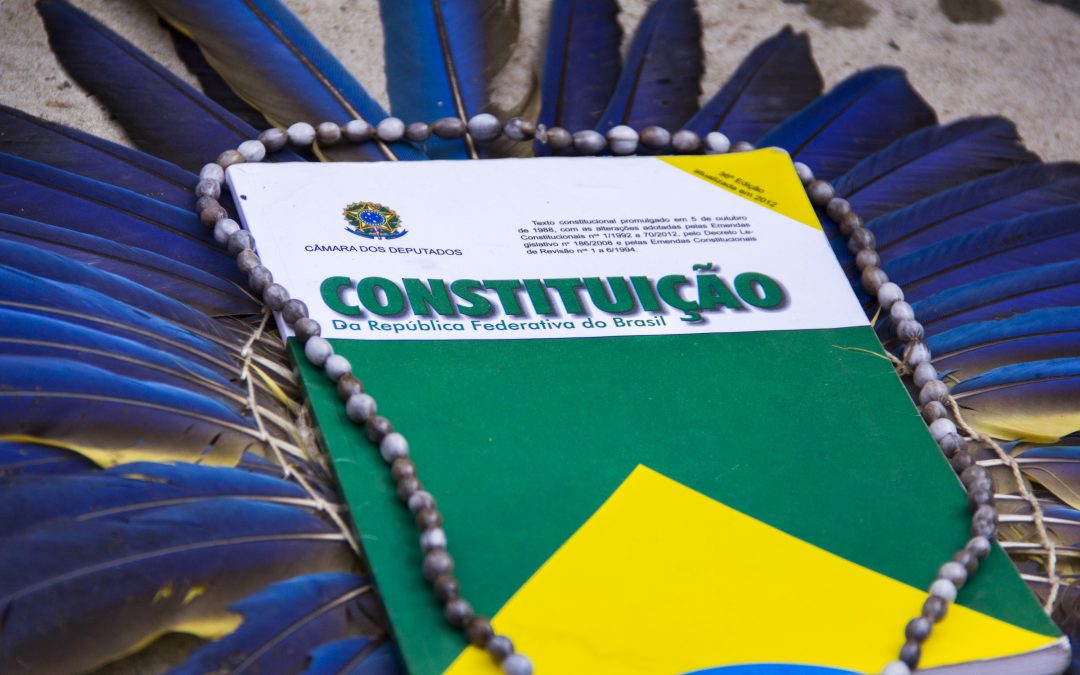
06/May/2021
APIB denounces to the Brazilian Federal Supreme Court and to the Inter-American Commission on Human Rights (IACHR) political persecution of the Bolsonaro government against indigenous peoples
The Articulation of Indigenous Peoples of Brazil (Apib) filed a report yesterday, 5, at the Inter-American Commission on Human Rights (IACHR) and at the Federal Supreme Court (STF) about the Federal Government’s political persecutions against Apib and Sonia Guajajara, one of the executive coordinators of the organization.
On April 26, during the month of the largest indigenous mobilization in Brazil and in the week following the Climate Summit meeting, the Federal Police (PF) summoned Sonia to testify in an open police investigation by the National Indian Foundation (Funai). The governmental agency, whose institutional mission is to protect and promote the rights of the peoples of Brazil, accuses Apib of defaming the Federal Government with the web series “Maracá” (http://bit.ly/SerieMaraca), which denounces right violations committed against indigenous peoples in the context of the Covid-19 pandemic.
“We alert the Inter-American Commission on Human Rights to the escalation of authoritarianism underway in Brazil. The democratic environment is at risk. In no republican and democratic state can the state apparatus be used under the discretion of its rulers. The free expression of thought and freedom of expression, supported by constitutional, conventional and legal principles, cannot be criminalized ”, reinforces Apib’s legal coordinator, Luiz Eloy Terena, in the report sent to the IACHR.
All violations of rights against indigenous peoples during the Covid-19 pandemic exposed by Apib in the Maracá series were presented to the STF in 2020, in the Fundamental Precept Failure Statement (ADPF) No. 709. On that occasion, the main court of the country acknowledged the complaints presented and determined that the Federal Government should adopt measures to protect the indigenous peoples. So far, the STF’s decision has been partially accepted by the government.
“The inquiry opened by the PF is a clear attempt to limit freedom to be critical, whether against the government or against its political agents, even if this is also part of the Democratic Rule of Law and that matters of public and social interest are under the tutelage of the constitutional cloak of the right to information ”, reinforced Eloy Terena in an excerpt from the complaint presented to the STF minister Roberto Barroso, who is the rapporteur for ADPF 709.
Inquiry suspended
On the same day of the denunciations made to the STF and IACHR, the Federal Court of the Federal District determined last night (5), at the request of Apib, to close the investigation opened by the Federal Police. Apib filed a lawsuit on May 3 to annul the investigation, which is an action of political persecution.
“It is also worth mentioning that the clear mention in FUNAI’s letter about alleged slanderous conduct against the President of the Republic suggests that the whole situation narrated has the main purpose of silencing political manifestations disclosed by an entity that stands against the present Federal Government”, federal judge Frederico Botelho argued in his decision.










